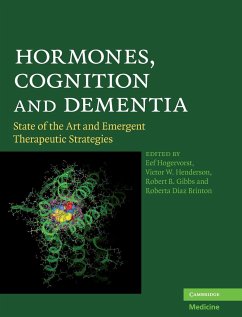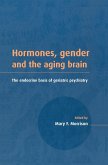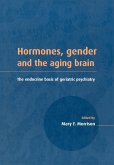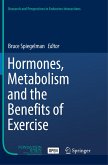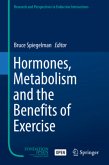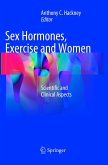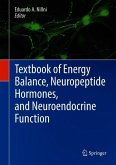Hormones, Cognition and Dementia
Herausgeber: Hogervorst, Eef
Hormones, Cognition and Dementia
Herausgeber: Hogervorst, Eef
- Gebundenes Buch
- Merkliste
- Auf die Merkliste
- Bewerten Bewerten
- Teilen
- Produkt teilen
- Produkterinnerung
- Produkterinnerung
Basic and clinical research on sex steroids, ageing, and cognition to integrate existing findings with emerging data.
Andere Kunden interessierten sich auch für
![Hormones, Gender and the Aging Brain Hormones, Gender and the Aging Brain]() Mary F. MorrisonHormones, Gender and the Aging Brain237,99 €
Mary F. MorrisonHormones, Gender and the Aging Brain237,99 €![Hormones, Gender and the Aging Brain Hormones, Gender and the Aging Brain]() Mary F. Morrison (ed.)Hormones, Gender and the Aging Brain127,99 €
Mary F. Morrison (ed.)Hormones, Gender and the Aging Brain127,99 €![Hormones, Metabolism and the Benefits of Exercise Hormones, Metabolism and the Benefits of Exercise]() Hormones, Metabolism and the Benefits of Exercise41,99 €
Hormones, Metabolism and the Benefits of Exercise41,99 €![Hormones, Metabolism and the Benefits of Exercise Hormones, Metabolism and the Benefits of Exercise]() Hormones, Metabolism and the Benefits of Exercise41,99 €
Hormones, Metabolism and the Benefits of Exercise41,99 €![Sex Hormones, Exercise and Women Sex Hormones, Exercise and Women]() Sex Hormones, Exercise and Women81,99 €
Sex Hormones, Exercise and Women81,99 €![Textbook of Energy Balance, Neuropeptide Hormones, and Neuroendocrine Function Textbook of Energy Balance, Neuropeptide Hormones, and Neuroendocrine Function]() Textbook of Energy Balance, Neuropeptide Hormones, and Neuroendocrine Function106,99 €
Textbook of Energy Balance, Neuropeptide Hormones, and Neuroendocrine Function106,99 €![Peptides, Hormones, and Behavior Peptides, Hormones, and Behavior]() Peptides, Hormones, and Behavior42,99 €
Peptides, Hormones, and Behavior42,99 €-
-
-
Basic and clinical research on sex steroids, ageing, and cognition to integrate existing findings with emerging data.
Hinweis: Dieser Artikel kann nur an eine deutsche Lieferadresse ausgeliefert werden.
Hinweis: Dieser Artikel kann nur an eine deutsche Lieferadresse ausgeliefert werden.
Produktdetails
- Produktdetails
- Verlag: Cambridge University Press
- Seitenzahl: 296
- Erscheinungstermin: 24. September 2009
- Englisch
- Abmessung: 260mm x 208mm x 21mm
- Gewicht: 862g
- ISBN-13: 9780521899376
- ISBN-10: 0521899370
- Artikelnr.: 26565342
- Herstellerkennzeichnung
- Libri GmbH
- Europaallee 1
- 36244 Bad Hersfeld
- gpsr@libri.de
- Verlag: Cambridge University Press
- Seitenzahl: 296
- Erscheinungstermin: 24. September 2009
- Englisch
- Abmessung: 260mm x 208mm x 21mm
- Gewicht: 862g
- ISBN-13: 9780521899376
- ISBN-10: 0521899370
- Artikelnr.: 26565342
- Herstellerkennzeichnung
- Libri GmbH
- Europaallee 1
- 36244 Bad Hersfeld
- gpsr@libri.de
Preface; Part I. Estrogens and Cognition: 1. Women's Health Initiative
Memory Study (WHIMS) program; 2. Identifying risk-factors for cognitive
change in the Women's Health Initiative; 3. Estrogen therapy - relationship
to longevity and prevalent dementia in the oldest-old; 4. The critical
window hypothesis: hormone exposures and cognitive outcomes after
menopause; 5. Animal studies that support estrogen effects on cognitive
performance and the cholinergic basis of the critical period hypothesis;
Part II. Varieties of Estrogenic Therapy: 6. The healthy cell bias of
estrogen action through regulating glucose metabolism and mitochondrial
function; 7. Alternative estrogenic treatment regimes and the Kronos Early
Estrogen Prevention Study-Cognitive and Affective Substudy (KEEPS-CA); 8.
The use of transdermal 17-estradiol in the treatment of Alzheimer's
disease; 9. Alternative modes of treatment: pulsatile estradiol treatment;
10. In search of estrogen alternatives for the brain; Part III. Potential
Modulators and Modifiers of Estrogenic Effects: 11. Progesterone regulation
of neuroprotective estrogen actions; 12. Clinical data of estrogen's
effects in the central nervous system; 13. Different forms of soy
processing may determine the positive or negative impact on cognitive
function of Indonesian elderly; 14. Hypothalamus-pituitary-adrenal axis
activity in aging women; Part IV. Possible Genetic Factors Related to
Hormone Treatment Effects: 15. Possible genetic polymorphisms related to
sex steroid metabolism and dementia in women; 16. Genetics related to sex
steroids: implications for Alzheimer's disease; 17. Apolipoprotein E,
hormone therapy and neuroprotection; 18. Testosterone, gonadotrophins and
genetic polymorphisms in men with Alzheimer's disease; Part V.
Testosterone, Estradiol and Men, and Sex Hormone Binding Globulin: 19.
Androgens and cognitive functioning in women; 20. The role of estradiol in
testosterone treatment; 21. Endogenous testosterone levels and cognitive
aging in men; 22. Clinical trials and neuroimaging studies of testosterone
in men: insights into effects on verbal memory; 23. Testosterone therapy
and Alzheimer's disease: potential for treatment and prevention in women;
24. Endogenous estradiol and dementia in elderly men: the roles of vascular
risk, sex hormone binding globulin, and aromatase activity; 25.
Testosterone regulates Alzheimer's disease pathogenesis; Part VI.
Gonadotropin Effects: 26. Involvement of gonadotropins in cognitive
function: implications for Alzheimer's disease; 27. The role of
gonadotropins and testosterone in the regulation of beta amyloid
metabolism; 28. Epilogue; 29. Concluding remarks; Index.
Memory Study (WHIMS) program; 2. Identifying risk-factors for cognitive
change in the Women's Health Initiative; 3. Estrogen therapy - relationship
to longevity and prevalent dementia in the oldest-old; 4. The critical
window hypothesis: hormone exposures and cognitive outcomes after
menopause; 5. Animal studies that support estrogen effects on cognitive
performance and the cholinergic basis of the critical period hypothesis;
Part II. Varieties of Estrogenic Therapy: 6. The healthy cell bias of
estrogen action through regulating glucose metabolism and mitochondrial
function; 7. Alternative estrogenic treatment regimes and the Kronos Early
Estrogen Prevention Study-Cognitive and Affective Substudy (KEEPS-CA); 8.
The use of transdermal 17-estradiol in the treatment of Alzheimer's
disease; 9. Alternative modes of treatment: pulsatile estradiol treatment;
10. In search of estrogen alternatives for the brain; Part III. Potential
Modulators and Modifiers of Estrogenic Effects: 11. Progesterone regulation
of neuroprotective estrogen actions; 12. Clinical data of estrogen's
effects in the central nervous system; 13. Different forms of soy
processing may determine the positive or negative impact on cognitive
function of Indonesian elderly; 14. Hypothalamus-pituitary-adrenal axis
activity in aging women; Part IV. Possible Genetic Factors Related to
Hormone Treatment Effects: 15. Possible genetic polymorphisms related to
sex steroid metabolism and dementia in women; 16. Genetics related to sex
steroids: implications for Alzheimer's disease; 17. Apolipoprotein E,
hormone therapy and neuroprotection; 18. Testosterone, gonadotrophins and
genetic polymorphisms in men with Alzheimer's disease; Part V.
Testosterone, Estradiol and Men, and Sex Hormone Binding Globulin: 19.
Androgens and cognitive functioning in women; 20. The role of estradiol in
testosterone treatment; 21. Endogenous testosterone levels and cognitive
aging in men; 22. Clinical trials and neuroimaging studies of testosterone
in men: insights into effects on verbal memory; 23. Testosterone therapy
and Alzheimer's disease: potential for treatment and prevention in women;
24. Endogenous estradiol and dementia in elderly men: the roles of vascular
risk, sex hormone binding globulin, and aromatase activity; 25.
Testosterone regulates Alzheimer's disease pathogenesis; Part VI.
Gonadotropin Effects: 26. Involvement of gonadotropins in cognitive
function: implications for Alzheimer's disease; 27. The role of
gonadotropins and testosterone in the regulation of beta amyloid
metabolism; 28. Epilogue; 29. Concluding remarks; Index.
Preface; Part I. Estrogens and Cognition: 1. Women's Health Initiative
Memory Study (WHIMS) program; 2. Identifying risk-factors for cognitive
change in the Women's Health Initiative; 3. Estrogen therapy - relationship
to longevity and prevalent dementia in the oldest-old; 4. The critical
window hypothesis: hormone exposures and cognitive outcomes after
menopause; 5. Animal studies that support estrogen effects on cognitive
performance and the cholinergic basis of the critical period hypothesis;
Part II. Varieties of Estrogenic Therapy: 6. The healthy cell bias of
estrogen action through regulating glucose metabolism and mitochondrial
function; 7. Alternative estrogenic treatment regimes and the Kronos Early
Estrogen Prevention Study-Cognitive and Affective Substudy (KEEPS-CA); 8.
The use of transdermal 17-estradiol in the treatment of Alzheimer's
disease; 9. Alternative modes of treatment: pulsatile estradiol treatment;
10. In search of estrogen alternatives for the brain; Part III. Potential
Modulators and Modifiers of Estrogenic Effects: 11. Progesterone regulation
of neuroprotective estrogen actions; 12. Clinical data of estrogen's
effects in the central nervous system; 13. Different forms of soy
processing may determine the positive or negative impact on cognitive
function of Indonesian elderly; 14. Hypothalamus-pituitary-adrenal axis
activity in aging women; Part IV. Possible Genetic Factors Related to
Hormone Treatment Effects: 15. Possible genetic polymorphisms related to
sex steroid metabolism and dementia in women; 16. Genetics related to sex
steroids: implications for Alzheimer's disease; 17. Apolipoprotein E,
hormone therapy and neuroprotection; 18. Testosterone, gonadotrophins and
genetic polymorphisms in men with Alzheimer's disease; Part V.
Testosterone, Estradiol and Men, and Sex Hormone Binding Globulin: 19.
Androgens and cognitive functioning in women; 20. The role of estradiol in
testosterone treatment; 21. Endogenous testosterone levels and cognitive
aging in men; 22. Clinical trials and neuroimaging studies of testosterone
in men: insights into effects on verbal memory; 23. Testosterone therapy
and Alzheimer's disease: potential for treatment and prevention in women;
24. Endogenous estradiol and dementia in elderly men: the roles of vascular
risk, sex hormone binding globulin, and aromatase activity; 25.
Testosterone regulates Alzheimer's disease pathogenesis; Part VI.
Gonadotropin Effects: 26. Involvement of gonadotropins in cognitive
function: implications for Alzheimer's disease; 27. The role of
gonadotropins and testosterone in the regulation of beta amyloid
metabolism; 28. Epilogue; 29. Concluding remarks; Index.
Memory Study (WHIMS) program; 2. Identifying risk-factors for cognitive
change in the Women's Health Initiative; 3. Estrogen therapy - relationship
to longevity and prevalent dementia in the oldest-old; 4. The critical
window hypothesis: hormone exposures and cognitive outcomes after
menopause; 5. Animal studies that support estrogen effects on cognitive
performance and the cholinergic basis of the critical period hypothesis;
Part II. Varieties of Estrogenic Therapy: 6. The healthy cell bias of
estrogen action through regulating glucose metabolism and mitochondrial
function; 7. Alternative estrogenic treatment regimes and the Kronos Early
Estrogen Prevention Study-Cognitive and Affective Substudy (KEEPS-CA); 8.
The use of transdermal 17-estradiol in the treatment of Alzheimer's
disease; 9. Alternative modes of treatment: pulsatile estradiol treatment;
10. In search of estrogen alternatives for the brain; Part III. Potential
Modulators and Modifiers of Estrogenic Effects: 11. Progesterone regulation
of neuroprotective estrogen actions; 12. Clinical data of estrogen's
effects in the central nervous system; 13. Different forms of soy
processing may determine the positive or negative impact on cognitive
function of Indonesian elderly; 14. Hypothalamus-pituitary-adrenal axis
activity in aging women; Part IV. Possible Genetic Factors Related to
Hormone Treatment Effects: 15. Possible genetic polymorphisms related to
sex steroid metabolism and dementia in women; 16. Genetics related to sex
steroids: implications for Alzheimer's disease; 17. Apolipoprotein E,
hormone therapy and neuroprotection; 18. Testosterone, gonadotrophins and
genetic polymorphisms in men with Alzheimer's disease; Part V.
Testosterone, Estradiol and Men, and Sex Hormone Binding Globulin: 19.
Androgens and cognitive functioning in women; 20. The role of estradiol in
testosterone treatment; 21. Endogenous testosterone levels and cognitive
aging in men; 22. Clinical trials and neuroimaging studies of testosterone
in men: insights into effects on verbal memory; 23. Testosterone therapy
and Alzheimer's disease: potential for treatment and prevention in women;
24. Endogenous estradiol and dementia in elderly men: the roles of vascular
risk, sex hormone binding globulin, and aromatase activity; 25.
Testosterone regulates Alzheimer's disease pathogenesis; Part VI.
Gonadotropin Effects: 26. Involvement of gonadotropins in cognitive
function: implications for Alzheimer's disease; 27. The role of
gonadotropins and testosterone in the regulation of beta amyloid
metabolism; 28. Epilogue; 29. Concluding remarks; Index.

